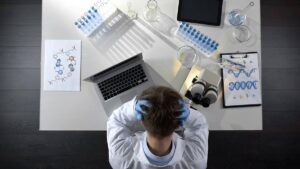Dr Boreham’s Crucible: A simpler device gives Atomo the upper hand in blood-based diagnostics

Pic: Oscar Wong / Moment via Getty Images
Luck’s a fortune, eh?
Atomo Diagnostics’ (ASX:AT1) ASX listing had been in the offing for months, based on its rapid blood-based diagnostic device for HIV that’s the only self-administered HIV assay approved by the local Therapeutic Goods Administration.
Then along came COVID-19 and a rush of “urgent inbound inquiries” from European, US and Chinese diagnostic companies, keen to evaluate the Atomo devices for their own COVID-19 rapid antibody tests.
The said antibodies are an immune response to the underlying virus, Sars-Cov-2.
While plenty of diagnosis and device houses globally are developing COVID-19 assays — or at least promising to do so — Atomo is off and racing. The devices already are being shipped to Europe under a ‘white label’ arrangement with French diagnostics house NG Biotech SAS, with US tie-ups likely as well.
A key feature of the underlying device is that it allows for self-administration, thus reducing the risk to healthcare workers.
Atomo’s platform can be tweaked for any number of purposes, including bacterial-versus-viral and pregnancy tests.
Malaria, hepatitis C and Ebola tests are also being targeted.
“We knew we could accommodate these other test strips quite easily,” Atomo founder and CEO John Kelly says. “Once the pandemic happened, we were able to get a working test developed quite quickly as the test device already existed.”
Keep it simple, stupid
A native of Northern Ireland’s scenic North Antrim Coast and with a background in product development, Kelly co-founded Atomo because the existing blood-based tests resembled a clumsy chemistry set suited only for professional use. Even in this context, those tests made well-documented errors.
He says product development was dominated by “PhDs in microbiology or molecular chemistry” concerned — not surprisingly — about the science of it all.
“No-one was focused on the end user,” he says.
“When everyone else in the market was saying ‘it’s all about the chemistry’, Atomo decided it was all about ease of use, aesthetics and ergonomics.”
Testing times
Atomo has sold more than 1.3 million tests to date, mainly for HIV assays.
The tests are either a finished product in a nice package, or a naked device to which original equipment manufacturers can add their own test strip (such as with the NG Biotech tie-up for the COVID-19 strips).
Atomo distributes its self-administered HIV test via Mylan Pharmaceuticals under an agreement covering 130 countries (Mylan being one of the biggest providers of HIV medicine). The company sells direct to consumers in Australia.
Under the overriding moniker of Atomo Rapid, the devices are sold under the Pascal and Galileo names. Newton and Franklin are digital enabled point-of-care devices still under development.
The tests take three steps, with a result in 15 minutes. While the pin-prick procedure requires more exposure to the virus than swab-based molecular lab-based tests, they can also test for antibodies after the symptoms and virus have disappeared (or in asymptomatic patients).
Given South Korean COVID-19 patients have been detected with reinfection — or perhaps the disease never properly left their bodies — such detection is becoming crucial in controlling the blight.
Technically speaking, the tests are lateral flow immunoassays. This involves a liquid sample (blood) being absorbed into a sample pad, ensuring accurate and controlled flow.
Reagents bind to the target substance, creating a coloured line in the case of a positive test (sadly, the pregnancy tests do not distinguish blue for boy and pink for girl).
As of early May, NG Biotech had placed orders for 1.369 million COVID-19 test devices. Or more specifically, devices for COVID-19 testing purposes. The NG order book covers Britain as well as its homeland, with the Gallic military a key client.
NG Biotech has the right, but not the obligation, to buy 2.46 million tests this year.
Atomo through the ages
Based in a nondescript warehouse on Parramatta Road in Leichardt, Western Sydney, Atomo was founded by Kelly and directors of ID&E Pty Ltd in 2010 (product innovators George Sidis and Richard Sokolov).
The HIV self-test was evaluated in March 2015 and was launched in South Africa in late 2016 to “establish performance and market data”. The land of the springboks was an appealing location, because of the big market for HIV testing, as well as lower regulatory barriers to commercialisation.
In 2014, the Atomo Rapid test won ‘best in show’ at the health device equivalent of Crofts: the Medical Design Excellence Awards.
In 2015, the Global Health Investment Fund proffered a $US6m ($9.2m) loan to Atomo and in 2016 chipped in $US4.3m of equity. The fund is backed by the deep-pocketed Bill and Melinda Gates Foundation.
Atomo’s board business bent
Kelly was chief operating officer of ASX-listed Unilife and was instrumental in devising the world’s first glass pre-filled syringe with a retractable needle.
The good bit is that Sanofi Aventis acquired the rights to the device for $US47m. The bad bit is that Unilife itself entered bankruptcy protection in mid-2017, having made one or three promises too many.
By that time Kelly had long left the building. Earlier he had a senior role at Resmed (ASX:RMD), where he developed the Swift and Activa sleep apnoea masks.
“At Resmed and Unilife we got a good sense of what we needed to do and not to do,” Kelly says with a fine sense of diplomacy.
Atomo chairman John Keith is managing director of BNP Paribas and director Dr Curt LaBelle is president of the Bill and Melinda Gates-backed social impact venture, the Global Health Investment Fund.
Dr Paul Kasian was executive chairman of Genetic Technologies (ASX:GTG). As general counsel at the Australian Broadcasting Corporation, fellow director Ms Connie Carnabuci keeps Aunty’s numerous litigious enemies at bay.
Finances and performance
Atomo’s atomic initial public offer (IPO) involved issuing 150,000,010 shares (to be precise) to raise $30m, at 20c apiece. Post-IPO the company has just over 560 million shares on issue, including 155 million escrowed for two years and 58 million voluntarily escrowed for six to 12 months.
There are also just over 30 million unlisted options, exercisable at price hurdles between 3c and 25c. That sounds like money for jam, but the 3c options were merely ‘at the money’ when issued in 2012, while the 25c paper was well out of the money.
Atomo’s December half revenue of $937,000 compares with $540,000 for the whole of 2018-19 and $287,000 in 2017-18.
Similarly, the reported loss contracted from $4.8m in 2018-19 to $2.04m for the six months to December 31, 2019.
Atomo’s revenues to date pertain mainly to sales of the HIV test in Europe, Africa, Central and South America and southeast Asia.
Kelly says the pricing of the tests depends on the market and the channel. But a rule of thumb is $US10 to $US25 per test here and in Europe and $US3 to $US5 a test in poorer countries.
Atomo has ‘prequalified’ status with the World Health Organisation for the HIV self-tests, which in effect qualifies the company as a vendor to the health body’s third world health programs.
The higher volumes inherent in such contracts help to offset the lower margins.
And speaking of which, Atomo currently operates on a gross margin of around 50 per cent. Management has targeted a margin in the high 50s, which is all the more obtainable with the COVID-19 test.
Kelly says Atomo should break even in the “relatively near term” and doesn’t expect to have to raise capital in the near future — which is just as well.
“We outsource manufacturing and oversee it with a small technical team,” Kelly says. “We are not bloated; we do not have hundreds of employees.”
In their short, listed life Atomo shares have traded between 40c (April 24) and 56.5c (April 20).
Kelly accounts for about 13 per cent of the company, while property developer and enthusiastic biotech investor Lang Walker holds 10.4 per cent.
Former Macquarie Bank chief Allan Moss has a modest holding, having also invested in cancer diagnostic outfit Sienna Diagnostics.
The dawn of the Atomo-ic age?
Ultimately, the company is striving for what Kelly dubs the equivalent of “Intel Inside” status: “If it’s not on an Atomo device, it’s not fit for purpose.”
Management expects HIV revenues to continue to grow strongly, with potential other applications for ailments including anemia, allergies and celiac (gluten intolerance) disease.
“We see the opportunity for over the counter [devices] and self-help in a range of applications,” Kelly says. “But for the next six months we will focus on delivering scale and contracts for COVID-19.”
While most device makers strive for 510k (devices) approval from the US Food and Drug Administration, Atomo bypassed the US HIV market as expensive and time consuming.
But Kelly says the COVID-19 test changes everything. “We are talking to US companies and we are especially keen to be first to get self-test approval,” he says.
“The situation is still pretty fluid.”
While reagent materials are supplied by a South African party, the company has built its own packing and assembling facility in Cape Town. The facility currently is being certified.
The devices themselves are built in China and the US by a manufacturing partner.
Dr Boreham’s (global lateral flow assay) diagnosis:
Atomo estimates the value of medical ‘global lateral flow assay’ revenues at $US2.47bn in 2019.
The World Health Organisation estimates 183 million HIV rapid diagnostic tests were procured in 2017, excluding China, with demand expected to exceed 500 million by 2021.
Furthermore, WHO estimates 700,000 people died in 2019 from antibiotic resistant bacterial infections.
Is that number for real? You better, you better, you bet. (Ask Pete Townshend.)
We stress that Atomo doesn’t have the HIV rapid blood diagnostic field to itself, with the prospectus listing three HIV self-test providers, all of which are WHO prequalified.
They are Chembio Diagnostics and Orasure Technologies of the US, and Canada’s Biolytical Labs.
But in building a simpler mouse trap, Atomo should catch more mice at a time when the market is richly rewarding much more tenuous links with the virus crisis that isn’t going away in a hurry.
“We think COVID-19 will be around for a number of years,” Kelly says. “It’s not an Ebola type situation that disappeared in the short term.”
Disclosure: Dr Boreham is not a qualified medical practitioner and does not possess a doctorate of any sort. He speaks for his generation in hoping the current pandemic will simply f-f-fade away.
This column first appeared in Biotech Daily.

UNLOCK INSIGHTS
Discover the untold stories of emerging ASX stocks.
Daily news and expert analysis, it's free to subscribe.
By proceeding, you confirm you understand that we handle personal information in accordance with our Privacy Policy.








